
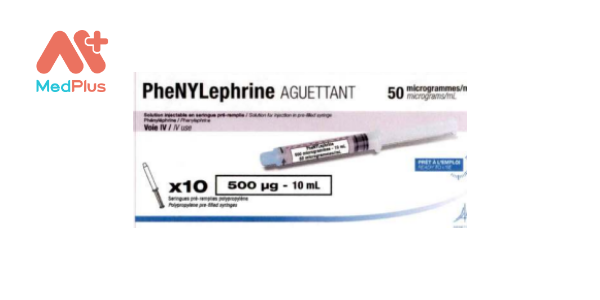
Phenilephrine Aguettant

Ask a doctor about a prescription for Phenilephrine Aguettant

How to use Phenilephrine Aguettant
Leaflet included in the packaging: patient information
Phenylephrine Aguettant, 50 micrograms/ml, solution for injection in a pre-filled syringe
Phenylephrinum
Read the leaflet carefully before using the medicine, as it contains important information for the patient.
- Keep this leaflet, you may need to read it again.
- If you have any further questions, ask your doctor, pharmacist, or nurse.
- If the patient experiences any side effects, including those not listed in the leaflet, they should inform their doctor, pharmacist, or nurse. See section 4.
Table of contents of the leaflet
- 1. What is Phenylephrine Aguettant and what is it used for
- 2. Important information before using Phenylephrine Aguettant
- 3. How to use Phenylephrine Aguettant
- 4. Possible side effects
- 5. How to store Phenylephrine Aguettant
- 6. Contents of the packaging and other information
1. What is Phenylephrine Aguettant and what is it used for
This medicine belongs to a group of medicines that stimulate adrenergic and dopaminergic receptors.
It is used to treat low blood pressure during anesthesia.
2. Important information before using Phenylephrine Aguettant
When not to use Phenylephrine Aguettant:
- if the patient is allergic to phenylephrine hydrochloride or any of the other ingredients of this medicine (listed in section 6);
- if the patient has severe high blood pressure or peripheral vascular disease (poor blood circulation);
- if the patient is taking monoamine oxidase inhibitors (MAOIs) (or within 2 weeks of stopping them), used to treat depression (e.g., iproniazid, nialamide);
- if the patient has severe hyperthyroidism.
Warnings and precautions
Before starting treatment with Phenylephrine Aguettant, the patient should discuss it with their doctor, pharmacist, or nurse:
- if the patient is elderly;
- if the patient has diabetes;
- if the patient has high blood pressure;
- if the patient has hyperthyroidism (uncontrolled hyperthyroidism);
- if the patient has vascular disease, such as arteriosclerosis (hardening and thickening of blood vessel walls);
- if the patient has poor blood circulation in the brain;
- if the patient has heart disease, including chronic heart disease, peripheral vascular disease, arrhythmias, tachycardia (rapid heart rate), bradycardia (slow heart rate), partial heart block, angina pectoris;
- if the patient has glaucoma (a rare eye disease).
In patients with severe heart failure, phenylephrine may worsen heart failure due to vasoconstriction.
During treatment, the patient's blood pressure will be monitored. In patients with heart disease, additional monitoring of vital signs will be performed.
Children
The use of this medicine is not recommended in children due to insufficient data on efficacy, safety, and dosage.
Phenylephrine Aguettant and other medicines
The patient should inform their doctor about all medicines they are currently taking or have recently taken, as well as any medicines they plan to take, such as:
- certain antidepressants (iproniazid, nialamide, moclobemide, toloxatone, imipramine, minaprine, or venlafaxine);
- medicines used to treat infections (linezolid);
- certain medicines used to treat migraines (dihydroergotamine, ergotamine, methylergometrine, methysergide);
- certain medicines used to treat Parkinson's disease (bromocriptine, lisuride, pergolide);
- a medicine used to inhibit the secretion of the hormone responsible for lactation (cabergoline);
- inhalation anesthetics (desflurane, enflurane, halothane, isoflurane, methoxyflurane, sevoflurane);
- a medicine used to reduce appetite (sibutramine);
- a medicine used to treat high blood pressure (guanethidine);
- medicines used to treat heart failure and certain arrhythmias (digitalis glycosides);
- a medicine used to treat arrhythmias (quinidine);
- a medicine used during childbirth (oxytocin).
Pregnancy and breastfeeding
The safety of using this medicine during pregnancy and breastfeeding has not been established, but if necessary, Phenylephrine Aguettant can be administered during pregnancy.
The use of this medicine is not recommended during breastfeeding. However, in the case of a single administration during childbirth, breastfeeding is possible.
If the patient is pregnant or breastfeeding, or thinks they may be pregnant or plans to have a child, they should consult their doctor, pharmacist, or nurse before using this medicine.
Driving and using machines
The patient should discuss with their doctor if they plan to drive or operate machinery after receiving this medicine.
Phenylephrine Aguettant contains sodium
This medicine contains 37.2 mg of sodium (a major component of common salt) per pre-filled syringe.
This corresponds to 1.9% of the maximum recommended daily intake of sodium in the diet for adults.
3. How to use Phenylephrine Aguettant
The medicine is administered exclusively by medical personnel after proper training and with sufficient equipment, who will determine the appropriate dose for the patient, time, and method of injection.
Recommended doses are as follows:
Use in adults
The doctor will determine the dose to be administered. The dose may be repeated or adjusted until the desired effect is achieved.
Use in patients with renal impairment(abnormal kidney function)
In patients with renal impairment, smaller doses of phenylephrine may be necessary.
Use in patients with hepatic impairment(abnormal liver function)
In patients with liver cirrhosis, larger doses of phenylephrine may be necessary.
Use in the elderly
Caution should be exercised when treating elderly patients.
Use in children
The use of this medicine is not recommended in children due to insufficient data on efficacy, safety, and dosage.
Overdose of Phenylephrine Aguettant
The following symptoms may occur: palpitations, arrhythmias (tachycardia, arrhythmias).
In case of any further questions related to the use of this medicine, the patient should consult their doctor, pharmacist, or nurse.
4. Possible side effects
Like all medicines, this medicine can cause side effects, although not everybody gets them.
Some side effects can be serious (frequency not known). The patient should immediately inform their doctor if they experience any of the following side effects:
- chest pain or angina pectoris,
- irregular heart rhythm,
- palpitations in the chest,
- bleeding in the brain (speech disorders, dizziness, paralysis of one side of the body),
- psychosis (loss of contact with reality).
Other side effects may include (frequency not known):
- allergic reaction,
- excessive dilation of the pupils,
- increased pressure in the eye (worsening of glaucoma),
- hypersensitivity (excessive sensitivity of the organ or part of the body),
- agitation (anxiety),
- fear,
- disorientation,
- headache,
- nervousness,
- insomnia (difficulty falling asleep or sleeping),
- nausea,
- burning sensation of the skin,
- tingling or numbness of the skin (paresthesia),
- slow or rapid heart rate,
- high blood pressure,
- difficulty breathing,
- fluid in the lungs;
- nausea,
- vomiting,
- sweating,
- pallor or blanching of the skin,
- thickening of the skin,
- tissue damage at the injection site,
- muscle weakness,
- difficulty urinating or urinary retention.
Reporting side effects
If the patient experiences any side effects, including those not listed in the leaflet, they should inform their doctor, pharmacist, or nurse. Side effects can be reported directly to the Department of Post-Marketing Surveillance of Adverse Reactions to Medicinal Products, Office for Registration of Medicinal Products, Medical Devices, and Biocidal Products, Al. Jerozolimskie 181C, PL-02 222 Warsaw, Tel.: +48 22 49 21 301, Fax: +48 22 49 21 309, website: https://smz.ezdrowie.gov.pl. Side effects can also be reported to the marketing authorization holder. Reporting side effects will help to gather more information on the safety of the medicine.
5. How to store Phenylephrine Aguettant
The medicine should be stored out of sight and reach of children.
Do not use this medicine after the expiry date stated on the carton and syringe label. The expiry date refers to the last day of the month stated.
The doctor or nurse will check the expiry date.
There are no special requirements for storage temperature.
The blister should be stored in the outer packaging to protect it from light.
Before use, the syringe should be stored in an unopened blister.
Do not use this medicine if visible signs of deterioration are observed.
Each syringe, even if partially used, should be disposed of properly after use.
Medicines should not be disposed of via wastewater or household waste. The patient should ask their pharmacist how to dispose of medicines that are no longer needed. This will help protect the environment.
6. Contents of the packaging and other information
What Phenylephrine Aguettant contains
The active substance is phenylephrine hydrochloride.
- Each ml of solution for injection contains phenylephrine hydrochloride equivalent to 50 micrograms of phenylephrine.
- Each 10 ml pre-filled syringe contains phenylephrine hydrochloride equivalent to 500 micrograms of phenylephrine.
- The other ingredients are sodium chloride, sodium citrate dihydrate, citric acid monohydrate, sodium hydroxide, and water for injections.
What Phenylephrine Aguettant looks like and contents of the pack
Phenylephrine Aguettant is a clear, colorless solution in a 10 ml, polypropylene pre-filled syringe, packaged individually in a clear blister.
The pre-filled syringes are available in packs of 1 and 10 syringes.
Not all pack sizes may be marketed.
Marketing authorization holder and manufacturer
Laboratoire Aguettant
1 rue Alexander Fleming
69007 Lyon
France
Laboratoire Aguettant
Lieu-DitChantecaille
07340 Champagne
France
Date of last revision of the leaflet:
Detailed information on this medicine is available on the website of the Office for Registration of Medicinal Products, Medical Devices, and Biocidal Products.
The following information is intended for healthcare professionals only:
Preparation of the syringe
The pre-filled syringe is for single patient use only. The syringe should be disposed of after use. Do not reuse.
The contents of the unopened and undamaged blister are sterile and should not be opened until the time of use. Before administration, a visual inspection should be performed to check for particles and discoloration. Only a clear, colorless solution free from particles or precipitates should be used.
The product should not be used if the protective cap of the syringe is damaged.
The outer surface of the syringe is sterile until the blister is opened.
Using an aseptic technique, Phenylephrine Aguettant, 50 micrograms/ml, solution for injection can be placed on a sterile field.
- 1) Remove the pre-filled syringe from the sterile blister.
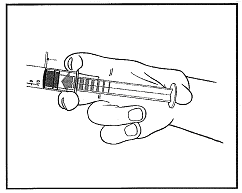

- 2) Press the plunger to release the rubber stopper. The sterilization process may have caused the rubber stopper to stick to the syringe body.
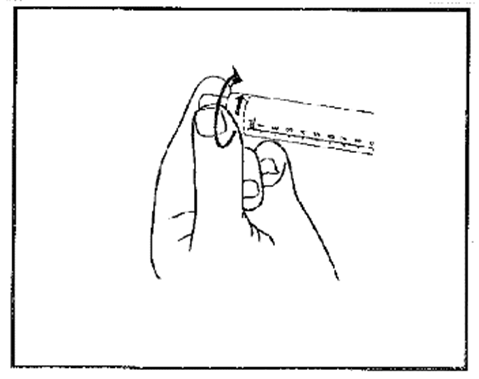
- 3) Remove the protective cap to break the seal. Do not touch the exposed luer lock to avoid contamination.
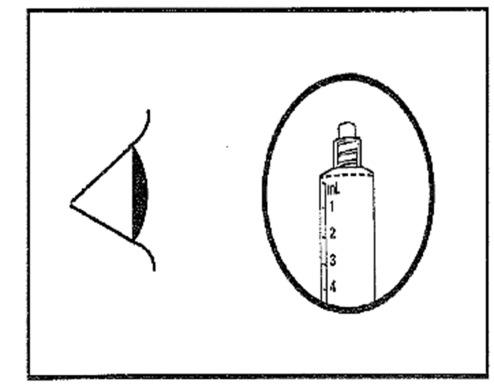
- 4) Check if the protective cap of the syringe has been completely removed. If not, replace the cap and twist it again.
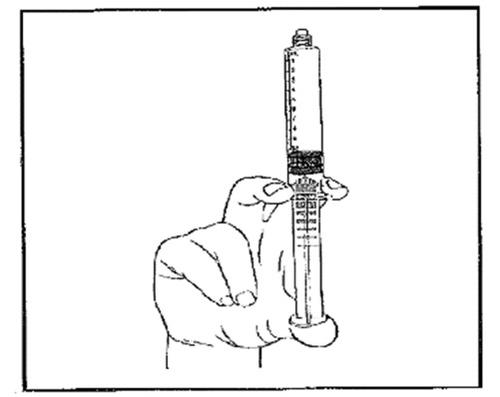
- 5) Gently push the plunger to expel the air.
- 6) Connect the syringe to the venous access. Slowly press the plunger to inject the required volume.
- 7) Any unused medicinal product or waste material should be disposed of in accordance with local requirements.
- Country of registration
- Active substance
- Prescription requiredYes
- Manufacturer
- ImporterLaboratoire Aguettant Laboratoire AGUETTANT
- This information is for reference only and does not constitute medical advice. Always consult a licensed doctor before taking any medication. Oladoctor is not responsible for medical decisions based on this content.
- Alternatives to Phenilephrine AguettantDosage form: Solution, 0.1 mg/mlActive substance: phenylephrineManufacturer: Sintetica GmbH Sirton Pharmaceuticals SpA.Prescription not requiredDosage form: Solution, 10 mg/mlActive substance: phenylephrineManufacturer: Sintetica GmbH Sirton Pharmaceuticals SpA.Prescription not requiredDosage form: Solution, 100 micrograms/mlActive substance: phenylephrineManufacturer: Laboratoire AguettantPrescription not required
Alternatives to Phenilephrine Aguettant in other countries
The best alternatives with the same active ingredient and therapeutic effect.
Alternative to Phenilephrine Aguettant in Ukraine
Alternative to Phenilephrine Aguettant in Spain
Online doctors for Phenilephrine Aguettant
Discuss dosage, side effects, interactions, contraindications, and prescription renewal for Phenilephrine Aguettant – subject to medical assessment and local rules.










